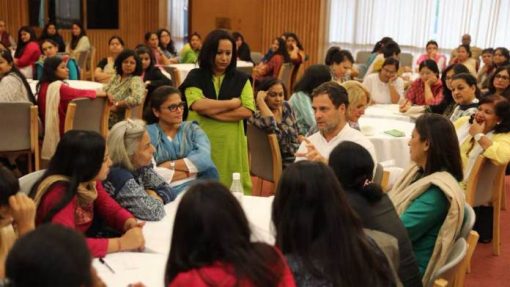
The Indian Women's Press Corps, an august body promoting segregation in a profession that can only function effectively without, is in the midst of deep conflict. Currently. Why? Because of an interaction with Congress president Rahul Gandhi with over 50, some say 100, women journalists held at the India International Centre amidst deep secrecy.
The Congress likes secrecy, surprised though that women journalists like it too.
The controversy is on who was, or was not invited. And who helped organise this selective interaction. Was it the IWPC? If so why was it not held at the organisation’s office and opened for all members? Why were some invited, and not the rest? On what basis was the list made?
Or was it the Congress? That to my women colleagues would be more acceptable, but then the Congress too is not taking the credit. And worthies within let it be known that the initiative was not theirs but that of the IWPC. But then the president and some of the office bearers did not attend the interaction. So then the question is how could it be described as a IWPC function when the IWPC was itself not represented? And so on and so forth.
The secrecy was amazing though. And not a word came out except to some women journalists, who angrily took the IWPC to task, and found their way to IIC to attend the meeting. I was not invited of course, so cannot say whether it was worth the effort. But then segregation of the Congress kind, “Muslim intellectuals”, “Women journalists” unfortunately has never been my cup of tea.
Very angry are Congress beat journalists—and justifiably so—as this interaction with Rahul Gandhi was denied them. Why? Simple. Because most of them are male scribes and hence did not qualify.
As a journalist who has spent her early days in the career, like many of us, fighting to be recognised as a journalist and not a woman journalist, the clock seems to have turned full circle. And in not a good way. We fought editors who sought to push us into our little corners to cover “women” functions, we insisted we would keep the same timings as men, cover the same assignments be it conflict or crime or massacres, because we were journalists, not women dammit! The fight was intense, difficult, at times impossible but we got our way and created the space where we were respected for our work. And seen as equals, good or bad.
I remember in The Indian Express when some new rookies were being taken in on the desk, They joined and soon after our News Editor walked into the reporters section, really looking harassed and upset. What do I do? One of the women says she cannot stay till the newspaper is put to bed (2a.m.), another says she cannot take public transport after it gets dark. Needless to say they were asked to leave, a step supported by all of us who had ensured that our work was not compromised by such limitations.
So when the IWPC came into existence I did not join it for years. (I joined in a weak moment as most of the women members are colleagues and friends and did not hesitate to lampoon me whenever we met). Why do we need a separate organisation? Because the Press Club of India is a watering hole? So why can’t we contest elections there and clean it up? Why do we need a separate body based on gender, when we are all journalists? And where we are all colleagues, covering the same stories, with the same compassion and honesty and courage. How do we justify setting ourselves apart as women scribes?
After all when Gauri Lankesh is killed, all journalists have to come together. Surely her assassination is not a women's issue. When Shujaat Bukhari is shot down, it is surely not just a male scribes issue. Why should women journalists claim exclusivity, and a separateness that goes against the very grain of journalism?
This morning I heard Jaya Bhaduri ask why male members in the House were not speaking about the increasing, horrific, attacks on women? Is rape now just a women's issue? Journalists are expected to report ‘women issues’ with the same skills, be they women or men. I simply cannot accept the reasoning that “women are more sensitive” for if the men are not equally so they need to find another profession. And in the years in this profession I have witnessed colleagues (men and women) do an equally good job when it comes to reporting such issues.
Also if this argument is taken to its logical conclusion, then men by virtue of access will be better political reporters than women. Or alone can cover conflict. Balderdash!
This segregation, of course, suits the political parties that can then further divide the profession that is already under deep attack. Rahul Gandhi meeting women journalists probably has a glamourous ring to it, but there would have been a time when any effort to so segregate would have been resisted by scribes themselves. It is a tragedy that we are wilfully allowing this to happen, and instead of being part of the larger fraternity are becoming an exclusive club (and dare I say an elitist body as compared to the Press Club of India that is egalitarian in its approach).




